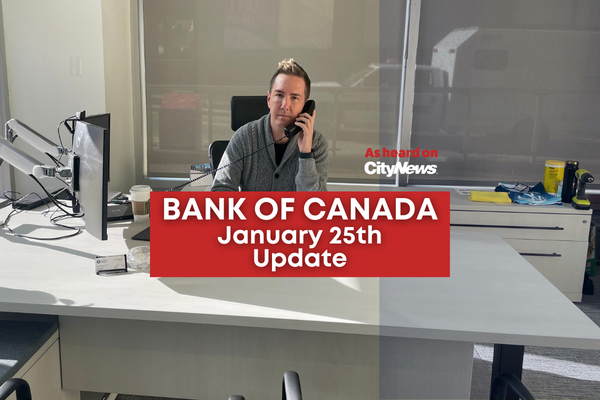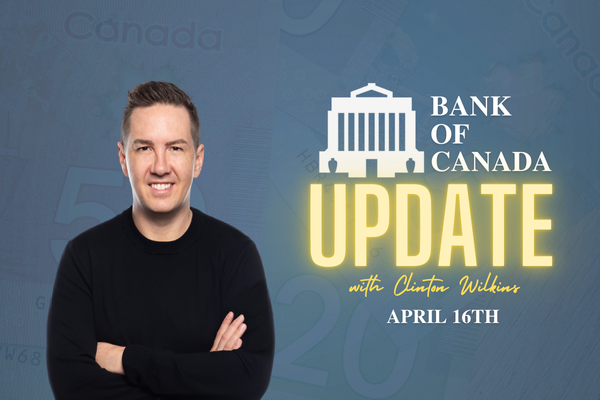On 95.7 News Radio, Clinton and Todd discussed the importance of credit monitoring due to rising fraud and data breaches.

Bank of Canada – Stay The Course, Protect Your Financial Future
Clinton chats with CityNews host, Sam Laprade in Ottawa about the latest Bank of Canada key interest rate increase. They talk about what’s on the horizon for homeowners, the advantages of a variable rate mortgage and how to protect your financial future.
Don’t feel like watching the video? Check out the transcript below.
Transcript:
Sam Laprade 00:11
Well, anybody with a variable mortgage was certainly holding their breath today. And we know that the Bank of Canada made an announcement a little bit earlier just after 10 o’clock today that that key interest rate has increased by 25 basis points. On days that the Bank of Canada make an announcement, or the days I call on Clinton Wilkins to get all of his wisdom. Hello, Clinton.
Clinton Wilkins 00:34
Hi Sam, how are you? Happy New Year,
Key interest rates increase by 25 basis points
Sam Laprade 00:36
Happy New Year to you. Clinton, of course is from Centum Home Lenders Limited. Clinton, these are the dates we have in our calendar. We know something’s coming, we were kind of hoping that they’re gonna pause. But today was 25 basis points. Not really a surprise, though Clinton.
Clinton Wilkins 00:52
I think it certainly wasn’t a surprise, we had a twitter poll up on my Twitter and on Instagram, and even just the general public where everybody was assuming that there was going to be a 25 basis point increase. I think it’s kind of widely accepted. And I think economists are really predicting that we may be basically at the top and now things are going to plateau. I think it’ll be really interesting to see what’s going to happen with inflation. As you know, in December, inflation has come down a little bit, I think at the peak, it was somewhere around 8.1% or 8%, during the peak, and now we’re down in that 6% range in terms of inflation. But, you know, inflation still has to come down more before Bank Of Canada will even consider, you know, stimulating the economy again, and bringing these rates down. Really what we think these rates are likely going to be high, you know, for the next year or so, while they’re really trying to battle inflation.
“If you’re early in your term, stay the course”
Sam Laprade 01:48
Can we talk about fixed rate mortgages and variable rate mortgages? So, so just really, basically Mortgage 101 if you will, let’s talk a little bit about why somebody chooses one over another.
Clinton Wilkins 02:01
Well, right now, Sam, a fixed rate is lower than a variable rate. So some consumers are choosing a fixed rate, just for the sole reason that it’s going to be lower today. Will it be lower over the next five year period of time? Likely? No, you know, we think that some of the fixed rates are near, you know, the top of where you know, where they may be. The good news is on the fixed rate front, over the last even couple of weeks, they’ve started to soften a little bit. So there are some better fixed rates out there. I think the question that a consumer really needs to ask themselves and everybody’s situation is different. Sam, what is your risk tolerance? You know, do we think that the rates are going to be as high in 12 months time? You know, I think over the next year, year, maybe two years, in some cases, a fixed rate may be lower. But historically, variable will be lower than the fixed, you know, we’ve seen increases over the last nine or 10 months, Sam, but in the past several years, variable has been lower. So I think that if you’re in a variable rate mortgage, and you’re early in your term, I would stay the course. If you have one year left, I think likely, it still would make sense to stay the course because the shorter term fix are still very, very high. So for an example, if a consumer was going to do a high ratio insured purchase today, you can get a five year fixed under 5%. So we’re talking, you know, mid high 4% range, the same product today in a variable is 5.7% plus. So as you can see, it’s about 1%, more to take a variable today versus a fixed, but what will those numbers look like in another 12 or 24 months? And I think that’s what you really need to think about.
Advantages of a variable rate
Clinton Wilkins 03:52
Another thing that’s really important, and many Canadians don’t think about this, when they’re going to get a mortgage is: are you going to break your mortgage early? And a lot of things change in people’s lives from, you know, maybe change of employment or loss of employment, matrimonial breakdown health issues, there’s a lot of reasons why consumers break the mortgage early. And the one big pro with the variable is if you break it early, it’s only three months interest. And I think the other thing that you need to think about, when and if the fixed rates continue coming down, you can always convert your variable rate mortgage into a fixed. You know, in my opinion, I think there’s still a strong case for many borrowers to take a variable. The one thing that we do need to take into consideration is, with every mortgage that we do, it has to go through a stress test. So are we you know, we’re qualifying people at 2% above whatever their contract rate is. And in some cases, people have to take a fixed rate because the rate is lower just to qualify.
Sam Laprade 04:47
Right. Well, as you know, Clinton, I just I just purchased a new home a couple of years ago that was being built so so I went through this process in 2022. And, you know, as a single mom that’s self employed, you know, by the time we got to the end of the stress test, I was asking where I needed to make my blood donation. Because it really felt like, you know, they really did, you know, ensure that I could handle this this mortgage because and I think it’s and I’m joking about it, obviously, but at the end of the day, I’m grateful for it. Because, you know, I never would want anyone to get into a situation, including myself, of course, that, you know, in the long term wasn’t going to work for my family. So, so those stress tests, although when you’re going through them, they’re not so fun Clinton, but but at the end of the day, you know, it ends up being a good thing.
“Sometimes consumers need to be protected against themselves.”
Clinton Wilkins 05:38
It’s protecting you, and it’s protecting the Canadian banking system. And, you know, there’s arguments about, you know, having open markets and all these things, but I think sometimes consumers need to be protected against themselves. My big concern, I think, is for existing homeowner, Sam, people that are coming up for renewal this year. You know, for us, we have hundreds of consumers that are coming up for renewal that are, we did mortgages for back in 2018. And they have rates in the 3% range. So those consumers are going to be renewing into much higher interest rates. And I think that’s a big conversation. We’re certainly having the conversation everyday with consumers. A lot of people are choosing to take a longer amortization, for the reason that the rates are quite high now, but also, everything else that’s going on with inflation. We know consumer goods are more expensive than they were.
Sam Laprade 06:26
And I know some people, you know, their mortgages gone up by $800, $1,000 a month. It’s almost like an additional mortgage payment. Clinton, I mean, this isn’t small money.
Protect your financial future
Clinton Wilkins 06:36
Yeah. And I think we have to be very cognizant of that. Not everyone is having a great time. You know, a lot of people are starting to feel the cracks of what’s happening with inflation with higher interest rates. And I think that’s what we need to be cognizant of. And I would really urge anyone that, you know, might be starting to feel this pinch, you know, start having the conversation, talk to your unbiased mortgage professional, you know, are you in the right product? Are there any changes that you should make to protect your financial future? And, you know, I think for us, everyone in our office, we’re certainly having those conversations with customers every day. And I think we need to put that cap on that not everything is rainbows and unicorns, and I think the next 12 months are going to be tough for a lot of people. And you know, we’re talking about rates right now, Sam, and we’re talking about inflation. But what happens in another 3, 6, 9, 12 months, when we’re starting to talk about people losing their jobs, right? So these are going to be certainly conversations that we’re going to be having.
Sam Laprade 07:32
Holding my breath again, Clinton, it’s definitely going to be an interesting 2023. And, and we know that these these changes at the Bank of Canada are making are here hard to hear. But but as we head towards that, you know, word recession, you know, it makes it makes people very, very nervous. You’re always so, so grateful to share all this information. I think as well Clinton about somebody today that’s thinking, will I ever be able to buy a house? What advice would you have for them?
Advice for future homeowners
Clinton Wilkins 08:02
I think it’s really about you know, sometimes cash is king, I think having savings is very, very important. I think obviously, income is a big piece. And I think monitoring your credit, I think monitoring the credit going forward, download Borrowell, download Credit Karma. They are free credit monitoring apps, and you can really keep a very close eye on that. The one piece of solace, I will tell our listeners with this 25 basis point increase at the Bank of Canada announced today, we may be at the top. And I think that anytime things plateau, it’s a lot easier to plan and make decisions. I think the uncertainty is very challenging for folks. So you know, we’re certainly gonna be back with you the Bank of Canada’s meeting again in March. And we’ll be back with you. And we’ll certainly report on the news and I’ll bring my perspective. I know. Not everyone talks about mortgage lending every day. Luckily, I get to do that and share my thoughts and opinions and and the news.
Sam Laprade 08:53
I appreciate very much Clinton Wilkins joining us today from Centum.Home lenders ltd. We’ll speak again in March, if not before that, Clinton. Thank you.
Clinton Wilkins 09:02
Thanks, Sam. Have a great day.
Sam Laprade 09:03
Appreciate Clinton’s perspective today. And that 25 basis points was, as Clinton mentioned, not unexpected, some people were hoping that maybe it was going to stay the course and not see any increase. Some people were predicting some economists were predicting 50 basis points. So we sort of met there in the middle and it’s 25 basis points for that interest rate hike today. When we come back. Michael Spratt is going to be here. He’s an Ottawa criminal defense lawyer. He’s going to be talking about the freedom convoy trial for Randy Hillier. It’s a really interesting story. You will not want to go anywhere. Stay with us on City News.
If you have any questions, get in touch with us at Clinton Wilkins Mortgage Team! You can call us at (902) 482-2770 or contact us here.


